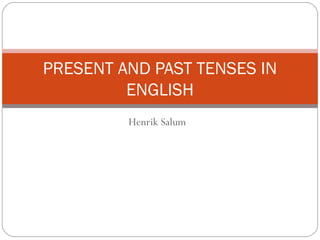
Present and past tenses in English
- 1. PRESENT AND PAST TENSES IN ENGLISH Henrik Salum
- 2. PRESENT SIMPLE (lihtolevik) Form: 1st form (+s) Use: 1. Things in general. Nurses look after patients in hospitals. 2. Things that happen all the time or repeatedly. She usually goes away at weekends. 3. Laws of nature (things that are true in general). The sun rises in the east. 4. Timetable events. The train leaves at 6.50 p.m.
- 3. Negative form: I don’t (do not) normally eat my lunch here. He doesn’t (does not) like this film at all. Question form: Do you live here? How often does it rain around here? Signal words: always, every day/month, never, normally, often, seldom, sometimes, usually etc.
- 4. PRESENT CONTINUOUS/PROGRESSIVE (kestev olevik) Form: am/is/are + ing Use: 1. Unfinished actions happening at or around the time of speaking. Listen! Somebody is crying. They are building a new bridge in our town. 2. Changes happening around now. The population of the world is increasing fast. 3. Arrangements for the future. I am flying to Toronto next Friday.
- 5. Negative form: We aren’t (are not) working at the moment. I am not enjoying this show very much. Question form: Are they playing football in the park right now? Why is she laughing? Signal words: at the moment, now, right now, Listen!, Look! etc.
- 6. PRESENT PERFECT (täisminevik) Form: have/has + past participle (3. põhivorm) Use: 1. An action in the past, where the fact, not the time, is important. I have been to England four times. 2. An action in the past that has a result now. She has lost her keys. 3. Something that began in the past and still continues now. He has been in hospital since Monday.
- 7. Negative form: We haven’t (have not) done our homework yet. He hasn’t (has not) visited his granny since August. Question form: Have we met before? How much of that book has she read? Signal words: already, ever, just, yet, so far, till now, up to now, never, since, etc.
- 8. PRESENT PERFECT CONTINUOUS (kestev täisminevik) Form: have/has + been + ing Use: 1. An activity that has recently or just stopped (the result is visible in the present). I am out of breath, because I have been running. 2. An activity that started in the past and is still happening. It has been raining for two hours. 3. Actions repeated over a period of time. She has been playing tennis since she was eight. 4. We are interested in the activity. It does not matter whether something has been finished or not. I have been painting the ceiling.
- 9. Negative form: I haven’t (have not) been learning Spanish very long. He hasn’t (has not) been eating properly. Question form: Has it been snowing recently? How long have you been working on the computer? Signal words: for 2 hours, since..., all day, etc.
- 10. PAST SIMPLE (lihtminevik) Form: 2nd form (-ed) Use: 1. A finished time in the past. We can ask when? I visited John yesterday. 2. Finished actions taking place one after another. I woke up, ate breakfast and went to work.
- 11. Negative form: I didn’t (did not) enjoy the film much. He didn’t (did not) go to school yesterday. Question form: Did you watch the match yesterday? What did you do at the weekend? Signal words: yesterday, last..., ago, in 1979, the other day, etc.
- 12. PAST CONTINUOUS/PROGRESSIVE (kestev minevik) Form: was/were + ing Use: 1. An action going on at a certain time in the past. The action started before that time, but was not finished. This time last year I was lying on a beach in Mali. 2. Actions taking place at the same time. I was listening to music while she was reading. 3. An action in the past that is interrupted by another action. We were eating when the doorbell rang.
- 13. Negative form: I wasn’t (was not) trying to impress anyone. They weren’t playing tennis at 10.30 yesterday. Question form: Was he watching TV when I called? What were you doing at 10 o’clock last night? Signal words: when, while, as long as, yesterday at 5, etc.
- 14. PAST PERFECT (enneminevik) Form: had + past participle (3. põhivorm) Use: 1. An action taking place before a certain time in the past. I had finished the work when you arrived.
- 15. Negative form: I liked the film because I hadn’t (had not) seen it before. He hadn’t even started the work before we arrived. Question form: Had you ever ridden a horse before? Why had they never performed before? Signal words: until that day, already, just, etc.
- 16. PAST PERFECT CONTINUOUS (kestev enneminevik) Form: had+ been + ing Use: 1. An activity that had recently or just stopped (the result was visible). I was out of breath, because I had been running. 2. An activity that started in the past and was still happening. It had been raining for two hours. 3. Actions repeated over a period of time. She had been playing tennis since she was eight. 4. We are interested in the activity. It does not matter whether something had been finished or not. I had been painting the ceiling.
- 17. Negative form: I hadn’t (had not) been learning Spanish very long. He hadn’t (had not) been eating properly. Question form: Had it been snowing recently? How long had you been working on the computer? Signal words: for 2 hours, since..., all day, etc.
- 18. THE END
